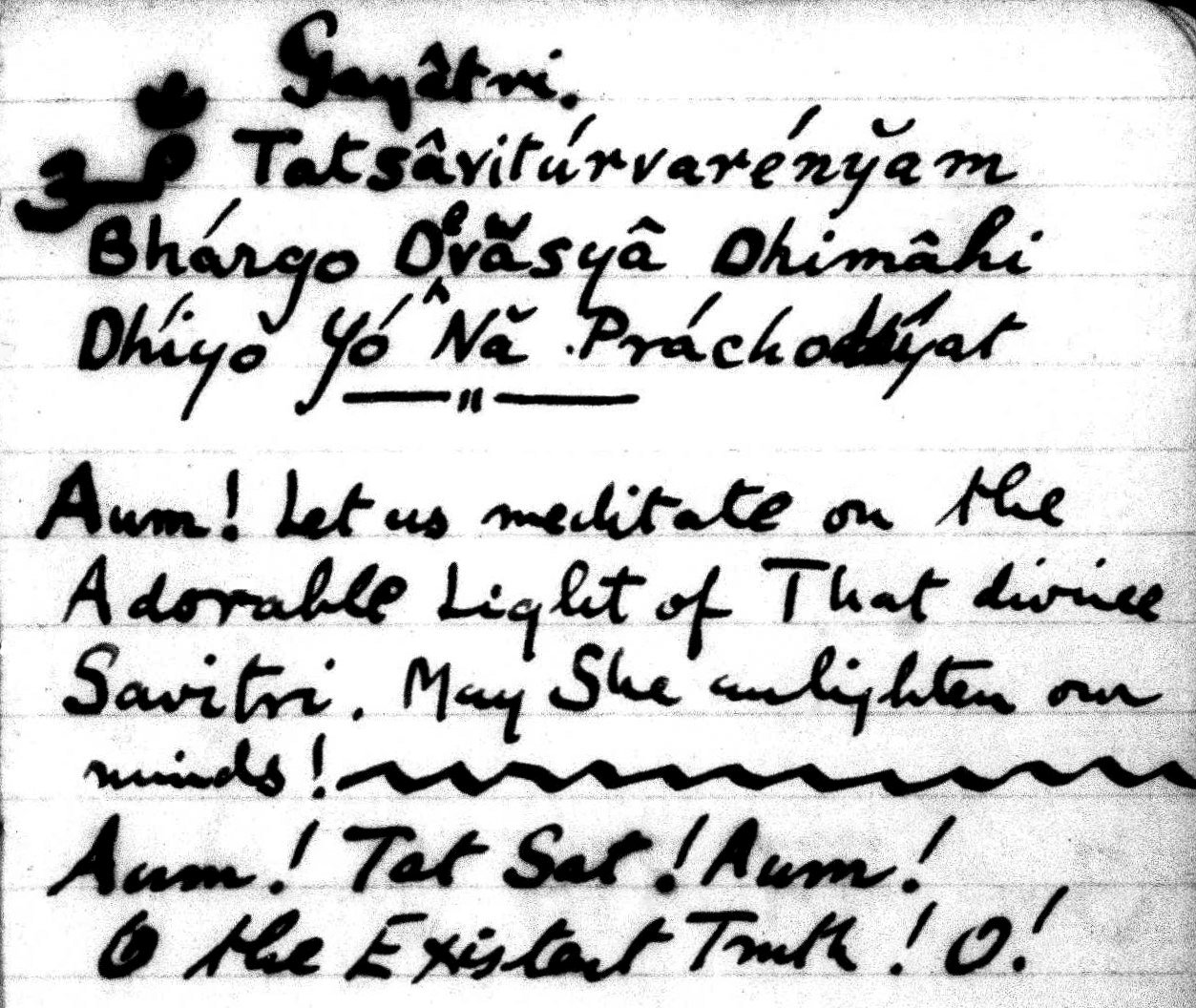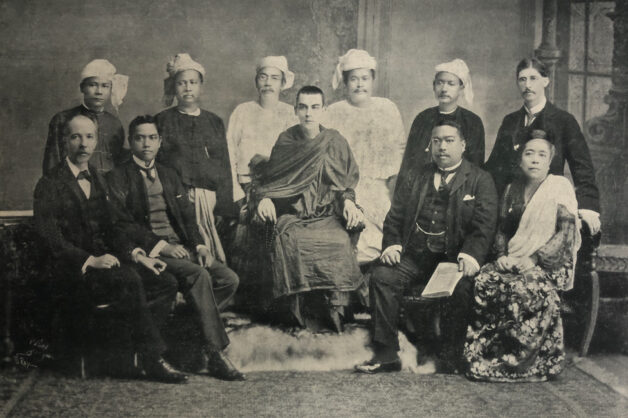Do what thou wilt shall be the whole of the Law
On April 22nd, 1917, Crowley wrote in his journal, “soul has no fear, nor can it. Therefore a man’s courage depends on the quantity of soul available. So, the most spiritual men are the most courageous.” Later that day he reports, “wrote Gayatri mantra”, which may be a reference to an obscure poem of his entitled, A Meditation upon Gayatri Mantra:
Aum! That Savitri worshipful!
Thy light divine I meditate.
Enlighten thou my mind! Abate
Greed, hate, and dullness! Truth annul
Change, sorrow, emptiness: instill
Bliss, Wit, and Being! Let my Will
Go its one way to its one goal
All one with its one source – my Soul.
Word in pure Silence consummate,
Will its attainment fixed in Fate,
Way perfectly achieved by Rest,
Wealth by pure Poverty possessed,
Wisdom complete by stilling thought,
And All identical with Naught.
Traditionally, many consider Gayatri as the most powerful mantra of all. It is said that when one chants Gayatri it penetrates the subconscious mind, wherein the seeds of thoughts and desires are sown, and can heal us by removing the cause of sorrow at its source. Mantras can be considered words that heal, sacred incantations which reverberate in the subtle and astral body. And so powerful is Gayatri, it is supposed, that repetition may grant enlightenment to anyone who chants it.
Late in life Crowley recorded in his journal that he greeted the new moon with, “Gayatri thrice, and offered 40 pounds in silver….”; variations of this practice are at times observed by Thelemites today. Crowley also includes this mantra in chapter two of Book 4 wherein he refers to it as the “famous Gayatri” and suggests that it should be read as trochaic tetrameters. For those not familiar with this term, trochaic tetrameters are a rhythmic structure applied mostly to poetry consisting of eight syllables per line. Similarly, Gayatri consists of 24 syllables divided over three lines of eight syllables each. Being that Crowley was a poet first and a mystic second, it is likely that he was familiar with trochaic tetrameters long before he was introduced to Gayatri, which I believe occurred while he was studying in India under the tutelage of Allan Bennett.
Allen Bennett had been interested in spiritual matters ever since childhood and, like Crowley, he too would reject the Christianity upon which he was raised in favor of his own path. To this end Bennett joined the Theosophical Society in 1893. And in the following year he was initiated into the Hermetic Order of the Golden Dawn, taking the motto Frater Iehi Aour, which means “let there be light.” Bennett’s genius was undeniable and he left a profound impression upon the superiors of the Order, and thereby rapidly advanced through the grades and was received into the Second Order in under a year’s time. Shortly thereafter (in 1898) Crowley joined the Golden Dawn, and it is there that the two first met. Like Bennett, Crowley also rapidly traversed through the grades. Almost immediately Bennett took a liking to the young Crowley and soon became both friend and mentor to him. For a short while Bennett resided with Crowley in his loft on Chancery Lane, trading lessons in Magick for room and board. This was a mutually beneficial arrangement and the time they spent together left a lasting impression upon Crowley that arguably forever informed his philosophy.
In that later part of 1899, Bennett decided to travel to Ceylon, seeking both a teacher and a home with a climate better suited to his health, which was legendarily poor. But, before he departed, he bequeathed several writings to Crowley, including the essay “The Training of the Mind” – which was published in The Equinox Volume 1 no. 5 and the Qabalistic dictionary known as Sepher Sephiroth which Crowley expanded and later published in The Equinox Volume 1 no. 6 In 1912. The fact that Crowley would include Bennett’s essays in this seminal work speaks to the value he still placed in his mentor’s teachings many years later..
In Ceylon (modern-day Sri Lanka), Bennett studied Yoga under the Yogi Shri Parananda. In August of 1901, Crowley and Bennett would travel together to Kandy, in Sri Lanka. There the two enjoyed an extended retreat practicing Yoga. It was during this period that Bennett ultimately concluded that Buddhism was indeed his calling.
It was while under Bennett’s tutelage that Crowley likely first heard Gayatri. Crowley’s unpublished journals from the time show that Bennett provided instruction on the Chakra system, Tattvas, Pranayama, Asana, Mantra, and the practice of Mahasatipatthana. It also provides insight into Crowley’s first experiences with Dharana and Dhyana.
Gayatri mantra is as follows:
AUM – Bhoor Bhuwah Swaha.
Tat Savitur Vareny-am
Bhargo Devasaya Dheemahi
Dhiyo Yo Naha Prachodayat.
Which Vivekananda translated as, “Om bhur bhuvah svah. We meditate on the glory of that Being who has produced the universe; may She enlighten our minds.” Similarly, and under Bennett’s tutelage, Crowley would translate this mantra as, “Aum! Let us meditate on the Adorable Light of That divine Savitri. May She enlighten our minds!” (See the attached image.) Gayatri is often associated with Savitri, the daughter of the solar deity Savitr and wife of the creator God Brahma.
In December Bennett would relocate to Burma in order to study Theravada Buddhism. There, he so intently studied the Buddhist texts in their original language of Pali, that he was allegedly able to converse in it fluently after just six months of study—a damn near impossible feat. A year later (in February of 1902), Bennett was ordained as a Buddhist monk, making him one of the earliest Westerners to receive such an honor. At his ordination he took the name Bhikkhu Ananda Metteyya, meaning “Bliss of loving kindness” and it became his life’s mission to bring Buddhism to Great Britain. As a means to this end, he established (and served as editor for) the periodical Buddhism: An Illustrated Quarterly Review. The first volume was published in September 1903 and so well was it received that within a year’s time the journal was being sent (free of cost) to nearly 600 libraries throughout England and Europe. Below I am including a rare image of Bennett sitting with “The Council of the Buddhasasana Samagama”, culled from this publication.
On a personal note, Bennett taught me that the real value in spiritual truths is rooted in our actions and not our knowledge. He wrote: If you aspire to lighten the burden of the world, to bring humanity a little nearer to the peace it craves—start right at home, and strive to free, to ennoble, to purify yourself, your own life, your own heart’s aspiration. Bennett innately understood that true happiness does not lie where most people go looking for it. Nor did he deny the First Noble Truth, that of Dukka and the suffering we see in the world, yet his words were always full of hope. He understood the heart of the Buddhist doctrine as only a true adept could.
He further wrote:
The world can only judge Buddhism by your actions, by your love, your life.
If we [Western practitioners] be indeed worthy of the name of followers of the Buddha, it behooves us, first and foremost, to understand the full meaning that that title has for us; and, not less essentially, to consider what course of action we must follow, if we are to make the most of the great opportunity that our Karma now has brought to us.
All that remains to us is action—not the vain claim that we are followers of the Buddha, whilst yet our lives are empty of the pity and the love and the helpfulness he taught, but action true, following to the best of our small powers.
You will be wondering how the sense of selfhood may be dissolved. The great dissolvent is love. True love is a union of the perceiver with the perceived; and I think you will not deny that the more nearly you come to union with another being, the less emphatically are you yourself.
The Goal of Buddhism is not in the hereafter, but here in the life we live—its goal is a life made glorious by self-conquest and exalted by boundless love and wisdom.
You must understand that Buddhism is no mere cut-and-dried philosophy but a living, breathing truth; a mighty power able to sweep whomsoever casts himself wholeheartedly into its great streams.
(So much of this, I believe, has its correlations in Thelema)
On March 9th 1923, Alan Bennett, who was poor of health his entire life, died at the young age of 51– but not before changing the world.
Love is the law, love under will
Orpheus


